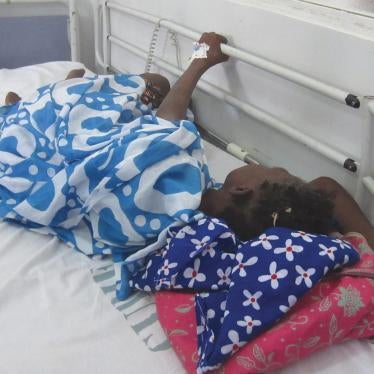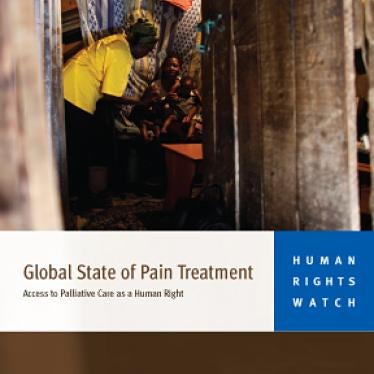Published in ThisDay South Africa
The South African government has promised to provide universal antiretroviral drug treatment as part of its new HIV/AIDS plan. The government’s recent experience of providing such drugs to rape survivors provides essential lessons as it prepares to implement the comprehensive programme.
In the face of South Africa's explosive HIV/AIDS epidemic, rape and other rampant forms of sexual violence can be a death sentence for women and girls. In April 2002 the government pledged to provide rape survivors with post-exposure prophylaxis (PEP)—antiretroviral drugs that can reduce the chances of contracting the virus from an HIV-positive attacker.
This is a promising programme, one that could become a model for other countries. But Human Rights Watch found last year that government inaction and misinformation by high-level officials had undermined the programme¹s effectiveness.
Children, an estimated 40 percent of rape and attempted rape survivors, are especially harmed by the state’s failure to take their needs into account.
Many girls are coerced into sex and subjected to sexual harassment and violence by male relatives, boyfriends, schoolteachers and classmates. The stigma of rape and the shame associated with child sexual abuse makes it even more difficult for children to seek help. As the South African Police Service has observed, many children are raped by members of their own families, and these crimes ‘tend to be kept secret’. This compounds the problem because children are likely to need adult assistance in seeking post-rape help.
By law, children under 14 cannot consent on their own to PEP services or the prerequisite HIV testing beforehand. This poses problems for children unaccompanied by a parent or legal guardian, a common problem, particularly for children in communities hard hit by HIV/AIDS. There are provisions to obtain consent where no parent or legal guardian can be reached. But as Human Rights Watch discovered, many medical staff and rape counsellors either did not know or did not follow them. And where time is critical—as it is with PEP services—these bureaucratic procedures may take too long.
South African law and policy provide a framework for the prompt provision of health services to rape survivors. Unfortunately, service providers often fail to follow these rules. Police often respond inadequately, neglecting to assist rape survivors with seeking medical treatment or, in some cases, turning rape survivors away. Coupled with health professionals’ insistence that rape survivors file a police report to get medical services, these failures have undermined access to PEP.
The government launched its PEP programme in near silence, failing to provide adequate information and training about PEP. Many rape survivors did not get PEP simply because neither they nor the agencies charged with providing such services knew about PEP or where to get it. After years of vocal opposition to antiretroviral drugs, the government should have provided clear messages of support for the PEP programme to have a chance of success. But the highly publicised HIV/AIDS debate in government circles left service providers confused about whether antiretroviral drugs work and whether it was government policy to provide them.
In one case, a government hospital did not provide PEP medicines until a non-governmental organisation (NGO) worker explained to the hospital superintendent that doing so was part of government policy. The NGO worker told me: ‘The superintendent was scared to give the antiretrovirals because he thought it was against government policy.’
Now the government is gearing up to provide universal antiretroviral treatment. This effort will face many of the same challenges as providing PEP: public education, professional training and access for children under the age of consent.
Given its dangerous history of ambivalence on the issue, the government has an obligation to provide clear, unequivocal support for antiretroviral drugs as part of comprehensive HIV/AIDS prevention and treatment. In the meantime, the dual epidemics of sexual violence and HIV/AIDS will continue to claim the lives of too many South Africans.
* Rebecca Schleifer is a researcher with the HIV/AIDS and Human Rights Programme of the NGO Human Rights Watch






